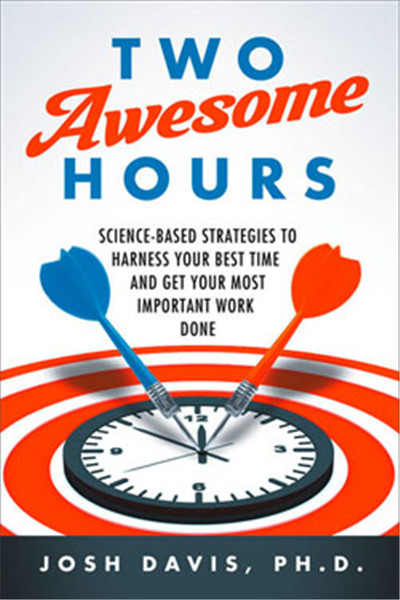I am writing this review in an open plan office. Fragments of conversation are wafting past as I flick between my bulging email inbox, the book and various online news sites as well as Facebook and Twitter.
我在一个开放式办公室写这篇书评。我在塞满邮件的收件箱、这本书、不同的新闻网站,还有Facebook和Twitter之间不停切换的时候,其他人聊天的片段不断飘过来。
Such an inability to focus is a well-documented byproduct of the modern “busyness”, leading to what writer Brigid Schulte described as the “overwhelm”.
这种无法专注是现代人“忙碌”状态的副产品,有关它的著述不少,它会引起作家布里吉德•舒尔特(Brigid Schulte)所说的“淹没感”。

The technological distractions (emails and social media) and unending workloads have spawned an industry — books, blogs and executive coaches — devoted to “life hacks” aimed at increasing our individual productivity through efficiency. This was perhaps exemplified by Tim Ferriss’s exhortation that we could shrink our workload to just half a day in The 4-Hour Workweek (2007).
让我们分心的科技产品(电子邮件和社交媒体)以及无穷无尽的工作负担催生了一个产业——提供“生活窍门”的书籍、博客和高管教练,旨在通过改善工作效率提高个人生产率。典型例子或许是蒂姆•费里斯(Tim Ferriss)在《每周工作4小时》(The 4-Hour Workweek, 2007)中对我们做出的敦促:我们可以把工作量减少到只需要半天来完成。
The latest book on the subject is Two Awesome Hours— promising “science-based strategies to harness your best time and get your most important work done” — by Josh Davis. He is an executive coach and director of research for the NeuroLeadership Institute, an organisation that synthesises scientific research and applies it to business and leadership.
有关这个问题的最新著作是乔希•戴维斯(Josh Davis)所著的《最棒的两小时》(Two Awesome Hours),这本书承诺教你“科学的策略,帮你利用最好的时间,完成最重要的工作”。戴维斯是一名高管教练,还担任NeuroLeadership Institute的研究主任。该机构将科学研究综合起来,应用到商业和组织领导中。
The answer is not to work longer and harder. So far, so conventional — countless studies show that long hours are counterproductive.
答案不是延长工作时间或者加强工作强度。到这里为止,这本书还没什么独特之处——已有数不胜数的研究表明长时间工作会适得其反。
However, where this book differs slightly from others is in the author’s suggestion that we should stop trying to force our wandering minds by sheer willpower. The key is to forget efficiency and instead prioritise and prepare for two “awesome” (the book, for the most part, mercifully stays away from such cheerleading language) hours a day of effectiveness instead.
然而,这本书与其他书的细微差异,在于作者建议我们不应再试图只靠意志力强制我们飘散的思绪。关键是忘记效率,决定好优先事项,每天准备好度过有成果的“最棒”两小时(幸运的是,这本书在大多数情况下没有使用“最棒”这种拉拉队式措辞)。
We are, after all, humans with emotions, rather than machines. There are sound evolutionary reasons, Davis argues, for our brains flitting about various distractions. Just as zebras are alert to a preying lion, so our ears tune in to colleagues’ chatter.
毕竟,我们是有情感的人,而不是机器。戴维斯认为,我们的大脑被各种事情分散注意力,从进化角度来说有充分的理由。就如斑马会警惕捕猎的狮子,我们的耳朵也会注意同事的闲聊。
“It is wholly unnatural to focus without wavering. If you have failed at maintaining continual focus throughout your work sessions, rejoice. If you had, you’d be remarkably dysfunctional,” Davis argues.
戴维斯表示:“保持专注不分神是完全不自然的。如果你没能在工作中持续保持专注,你该感到高兴。如果你能够做到,你就是极为不正常的。”
The more we will ourselves to focus, the less likely we are to succeed. We should allow our minds to drift, he suggests, drawing on the mindfulness trend.
我们越是用意志力强迫自己专注,就越有可能失败。他建议,我们应该让我们的思绪漂流,并利用好意识的趋势。
“The key is to let go of those thoughts that are not helping you stay on track, the way a surfer passes up the opportunity to ride those waves that are not quite right,” he writes. “Brains have lots of thoughts. You don’t have to react to each one just because it came up.”
“关键是放开那些对你保持正确的方向没有帮助的想法,就像冲浪者放弃乘上那些不太合适的波浪的机会那样,”他写道,“大脑中有很多的想法。你不必对每一个跳出来的想法做出反应。”
Moreover, forcing oneself to focus only depletes energy. Even declining a doughnut for breakfast, writes Davis, will consume some of that precious energy (which slightly goes against his nutrition advice).
此外,强迫自己专注只会消耗精力。戴维斯写道,即使是在早餐时拒绝吃一个甜甜圈,也会消耗一些宝贵的精力(这稍微违背了他给出的营养建议)。
Some of Davis’s tips are banal to say the least: “If you are working from home, turn off the TV” stands out.
戴维斯的一些诀窍至少可以说是平淡乏味的。“如果你在家中工作,关掉电视”就是突出的一例。
Other tips are for those who have control of their time — a day a week of quiet time working at home may not be practical for many employees. Yet there are other small modifications to the working day that are easily achievable.
其他诀窍是为那些能控制自己时间的人准备的——每周有一天能在家安静地工作,对许多员工来说或许不现实。然而,该书还提供了一些容易实现的对工作日的小改动。
However, the salient message — not to beat yourself up about meandering — may be worth the price of this short book alone. With that in mind, I am off to browse a shopping site.
然而,最主要的信息,也就是不要因为走神自责,可能就值回这本薄薄的书的价格了。想着这个,我要去浏览购物网站了。
Two Awesome Hours: Science-Based Strategies to Harness Your Best Time and Get Your Most Important Work Done, by Josh Davis; HarperOne, $25.99/£15.99
《最棒的两小时:利用最佳时间,完成最重要工作的科学策略》(Two Awesome Hours: Science-Based Strategies to Harness Your Best Time and Get Your Most Important Work Done),乔希•戴维斯著;HarperOne出版,售价25.99美元/15.99英镑













